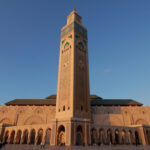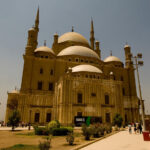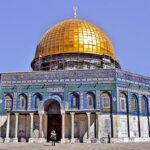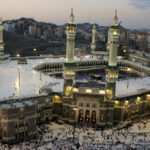Origin of Fiqh.
The Holy Prophet got most of his knowledge directly from God through the process of revelation. Whenever the Holy Prophet had a difficult point to decide, he got the guidance from Allah.
After the death of the Holy Prophet, the process of revelation ceased, and the task before the Muslims was to take decisions in the light of guidance that could be obtained from the Holy Quran and the Sunnah. That gave rise to Fiqh, the application of the principles of Islam to the day to day problems, and the settlement of disputes.
Father of Fiqh.
The process of Fiqh began with Abu Bakr, and he is regarded as the ‘Father of Fiqh’. He was the first to frame the rules of Ijtihad. He laid down the principle that in deciding a case he would obtain guidance the first instance from the Holy Quran.
If the Holy Quran was silent in the matter, he would look for guidance to the traditions of the Holy Prophet as duly authenticated. If the traditions were also silent he was to decide the case according to his best judgment He held: “If my decision is just then it will be from God. If it is erroneous, it will be mine, and may God pardon me.”
Primacy of Abu Bakr in the matter of Fiqh.
According to traditions, a woman came to the Holy Prophet in the last days of his life, and asked for his decision on a particular point. The Holy Prophet was unwell, and he asked her to come again. The woman said, “If I come next, and you are not there, to whom should 1 go?” The Holy Prophet said, “In that case go to Abu Bakr”. That establishes the primacy of Abu Bakr in the matter of Fiqh.
Burial of the Holy Prophet.
Immediately on the death of the Holy Prophet controversy arose as to the place where the Holy Prophet should be buried. Many different opinions were expressed in the matter. One view was that the Holy Prophet should be buried in the Prophet s mosque. Another view was that he should be buried in the common graveyard at Madina where his companions were buried.
One view was that he should be buried at Jerusalem where other prophets lay buried. And yet another view was that he should be buried in the Holy Ka’aba at Makkah. As successor to the Holy Prophet, Abu Bakr gave the decision that in accordance with a tradition of the Holy Prophet, the prophets are to be buried at the spot where they breathe their last, and as such he should be buried in the quarter of Ayesha where he had breathed his last. This decision commanded the approval of all, and was duly carried into effect
Property at Fidak.
The Holy Prophet had some property at Fidak. The income from the property was utilized for the maintenance of the family of the Holy Prophet, and for other beneficial purposes. After the death of the Holy Prophet, Fatima and some other members of the Holy Prophet’s family lodged a claim for the inheritance of the property.
Abu Bakr ruled that, according to a tradition of the Holy Prophet, all that the prophets leave is for the community, and the usual laws of inheritance are not to apply to such property. Abu Bakr accordingly did not accept the claim for inheritance. He ruled that the property would be state property, but the income therefrom would be utilized for the same purposes for which it was utilized during the lifetime of the Holy Prophet.
Exemption from Zakat.
Immediately after the death of the Holy Prophet when the wave of apostasy spread over the land, some of the tribes demanded that they should be exempted from the payment of Zakat. The companions around Abu Bakr advised that in view of danger that threatened the Muslims, the demand should be exempted Abu Bakr held that the payment of Zakat was a fundamental requirement of Islam, and it was not open to him to compromise on a fundamental injunction of Islam. He accordingly rejected the demand, and declared that if Zakat was not paid, he would fight for it.
Obedience to the orders of the Holy Prophet.
During his lifetime the Holy Prophet had ordered that an expedition should be sent to Syria under the command of Usama b Zaid. After the death of the Holy Prophet the general view of the companions was that in view of the danger that threatened Madina, the expedition to Syria should be abandoned.
It was held that if the expedition was to be necessarily sent, a veteran commander should be appointed instead of Usama who was a young lad of nineteen only. Abu Bakr held that as on these points the Holy Prophet had already given specific instructions, it was not open to him to amend or vary the orders of the Holy Prophet. He therefore ordered that the expedition to Syria was to be undertaken under the command of Usama as ordered by the Holy Prophet.
Murder of Malik b Nuweira.
When in the campaign against Bani Tamim, Khalid b Walid killed Malik b Nuweira, and married his beautiful wife Laila and it was alleged that Khalid was guilty of murdering a Muslim, Abu Bakr held that as Commander in the field, Khalid had the authority to exercise his discretion, and if Malik had been killed it was, in the circumstances of the case, a lapse and not a willful murder. Abu Bakr settled the case by paying blood money to the heirs of Malik. When Umar insisted on the punishment of Khalid Abu Bakr declared that he could not sheathe the sword, which God had willed to be wielded against the infidels.
Al Faja’a.
Al Faja’a, an adventurer posed to be a Muslim, and got some arms from Abu Bakr to fight against the apostates. Al Faja’a betrayed the trust. Action was taken against him. He was taken captive, and brought to Madina where Abu Bakr ordered him to be roasted alive. Later, Abu Bakr regretted the decision. He wished he had pardoned him or killed him in some other way.
Father’s share.
Once a man complained before Abu Bakr that his father wanted to appropriate all that he had. Abu Bakr summoned the father, and asked him to take as sufficed for his maintenance, and leave the rest to his son.
A son disowned by the father.
Once a man was brought before Abu Bakr who had been disowned by his father Abu Bakr ordered: “Smite him on his head for Satan is in his head.”
Vow of silence.
Once Abu Bakr went to a woman of the tribe of Ahmas called Zaynab. She did not speak as she was under a vow of silence. Abu Bakr said to her, “Speak, for silence is not lawful; it is one of the practices of the times of Ignorance.”
Loss of an ear.
Once in a quarrel a person had been deprived of an ear. Abu Bakr awarded him fifteen camels. He said, “The hair and turban will conceal the disgrace of it.”
Killing a man in anger.
Once Abu Bakr was enraged with a man and his anger became violent. One of the companions said, “O Caliph, shall I cut off his head?” Abu Bakr said, “Woe to you, this is not lawful.”
Unlawful food.
Once a slave of Abu Bakr brought him some food that he ate. Later the slave told him that he had earned some money by telling fortune, and the food had been purchased with that money. Abu Bakr held that such food was unlawful. He put his hand on his throat and vomited what was in his stomach.
Pre destination.
Once Abu Bakr was asked, “Do you think that fornication by a man is predestined?” He was next asked, “If it is predestined why should the man be punished?” Abu Bakr said, “The man is responsible for his act, but God knows beforehand how a man would act.”
Insulting the Holy Prophet and satirizing the Muslims.
In Yemen, a woman in her songs said nasty things against the Holy Prophet. Another woman recited verses satirizing the Muslims. Muhajir b Umayya, the Governor of Yemen cut off the hands of both the women. When the case was reported to Abu Bakr he held that the women who had insulted the Holy Prophet should have been killed, while the other woman who had merely satirized the Muslims deserved a lenient treatment.
Asma bint Numan.
In Yemen, Ikramah married a lady Asma bint Numan. The marriage became the subject of criticism because at one time Asma had been married to the Holy Prophet, and it was not lawful for a Muslim to marry a woman the Holy Prophet had married. Abu Bakr decided that as in that case the Holy Prophet had returned the lady to the tribe without consummating the marriage, there was no objection to a Muslim marrying her.
Marriage to the first husband.
Once a woman was divorced by a person, and she married another man. Before her second marriage was consummated she reconciled with her former husband, and wanted to return to him. Abu Bakr ruled that she could not return to her first husband unless the second marriage was consummated, and she was properly divorced.
The case of Umar’s son Aasim.
Umar divorced one of his wives, and she took her young son Aasim with her. One day Umar saw his son playing in the street. He lifted the boy and brought him to his house. The mother applied to Abu Bakr for the restoration of the child. Umar resisted the suit, but Abu Bakr decided the case against Umar, and awarded the custody of the child to the mother.
Grandfather’s share.
In a case where the father was not alive, but the grandfather was alive, Abu Bakr awarded to the grandfather the share otherwise admissible to the father.
Share of the grandson.
In a case where the son was not alive, Abu Bakr awarded to the grandson the share otherwise admissible to the son.
Share of the grandmother.
In a case, Abu Bakr awarded the grandmother one-sixth share in the property left by the grandson.
Execution of the thief.
Once a man came to Abu Bakr from Yemen. His hands had been cut off for some act of theft. He stayed with Abu Bakr for the night, and prayed for all the time. The man represented that the Governor of Yemen had cut off his hands in a high handed way. Abu Bakr felt impressed with the piety of the man, and thought that perhaps the Governor of Yemen had been unfair to the man. In the morning, Asma the wife of Abu Bakr complained that she had lost her locket. On enquiry it transpired that the man had stolen the locket, and sold it to a goldsmith. Abu Bakr ordered the man to be killed.
Mutilation.
About awarding the punishment of mutilation, Abu Bakr addressed a Governor as follows: “I have heard that you laid hands on a woman who had showered abuses on me, and you got her hands amputated. God has not sought vengeance even in the case of polytheism, which is a great crime. He has not permitted mutilation even with regard to manifest infidelity.
Try to be considerate and sympathetic in your attitude towards others in future. Never mutilate because it is a great offence. God purified Islam and the Muslims from rashness and excessive wrath. You are well aware of the fact that those enemies fell into the hands of the Messenger of Allah who had been recklessly abusing him, who had turned him out of his home, and who had fought against him, but he never ordered their mutilation.” (Abu Bakr ke Sarkari Khatut by Khurshid Ahmad Fariq.)
Visits: 0























